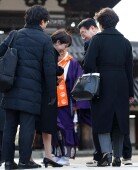[Opinion] Passionate Actors
In 2002, the U.S. Food and Drug Administration (FDA) approved Botox, a medication used in easing wrinkles, for cosmetic purposes. That year, rumor had it that Baz Luhrmann, director of the movie, Moulin Rouge, excluded from the cast an actress who had Botox injections to get a wrinkleless face. The reason: she could not express any feelings as her facial muscles got stiff. It would be fair to say that it was a collision between her desire as a woman to be more beautiful and her profession as an actress. Of course, she might have chosen to get Botox in order to act better.
Kim Seong-gi, an actor who plays a major role in the hit musical, Miss Saigon, collapsed in the middle of practices. He developed stroke due to hypertension. Among stage actors, who go through the extremes of emotions amid tension on the stage, there are so many with a vocational disease called hypertension. Not a few actors quit medication, saying hypertension drugs make it difficult for them to get immersed in acting. The hypertension drugs, which lower ones blood pressure and let him feel at ease by controlling sympathetic nerves, are nothing but poison for acting. These cases vividly illustrate the fierce professional spirit of an actor that overshadows the universal human desire to lead a healthy life.
Why me? Why should it be me? At the last scene of the play, Equus, Dr. Dysart, a psychiatrist, said so in a grave tone. It was an expression of his agony toward a destiny that his own will could never control. Kim Heung-gi, a 58-year-old actor who played Dr. Dysart back in 2004, also collapsed in the make-up room after the play due to stroke. He was such a passionate actor that he showed up at the theater four hours earlier than others to practice for seven to eight hours a day. Even when they felt so painful that they thought, Why me? they continued to make deep impressions on the audience, being so committed that they would rather fall down on the stage.
In the Chinese equivalent of the word actor, the first letter is a combination of un- and human. That might not be the only reason why all this is happening. You cannot tell all people with jobs they should risk their lives to do their best at work. At a time when even these inhuman people quit the medicine they have taken in an effort to do their job better, there are people who are too imprudent in doing what decides peoples destiny, and that is what makes us feel unhappy. I am talking about the people on the political stage who claim, Tax bombs are a distant future, or Even King Sejong the Great would have found it impossible to do the job right.
Kim Sun-deok, Editorial Writer, yuri@donga.com







